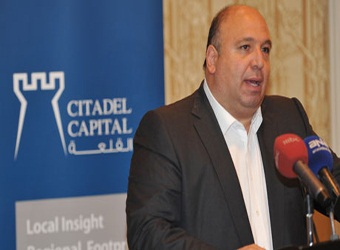Citadel Capital Managing Director and veteran investment banker Marwan Elaraby participated in a panel discussion with global turnaround guru Wilbur Ross, sharing views on the current investment climate in Africa and Egypt
“African markets will be the long-term engines of growth for Citadel Capital,” said Marwan Elaraby, Managing Director of Citadel Capital, the leading investment company in Africa and the Middle East with investments of US$ 9.5 billion and 10 focus platforms in five core industries: energy, transportation and logistics, agriculture and consumer foods, mining, and cement and construction.
“We will continue to focus our investments on North and East Africa as we staunchly believe that there are tremendous investment opportunities in those markets. Our investments are concentrated on high-growth industries that offer broad exposure to the region’s compelling macro fundamentals such as energy deregulation, demand for infrastructure and population growth,” said Elaraby.
Elaraby participated in a panel discussion entitled “Investing: a View From the Top” with global turnaround guru Wilbur Ross at the Bloomberg Doha Conference held on April 8-9.
The two-day event brought together CEOs, asset managers, investors and notable regional decision makers to examine the biggest challenges that face asset managers as they globalize.
Asked to comment on whether or not Citadel Capital faces competition from the large number of Chinese firms currently operating in Africa, Elaraby said, “Since we don’t have investments in large oil and gas projects, we don’t really compete with the Chinese. In fact, the Chinese companies operating in Africa are actually opening up new avenues for our investments such as Rift Valley Railways (RVR), the national railway of Kenya and Uganda, which is now facilitating the movement of incoming and outgoing freight from the Port of Mombasa.”
RVR links the Indian Ocean Port of Mombasa to the interiors of Kenya and Uganda, including the Ugandan capital of Kampala. As the operator of the century-old railway, Citadel Capital is helping move cargo and consumer goods at much lower costs.
Commenting on the tense political situation in Egypt and the devaluation of the Egyptian pound, Elaraby noted that “the devaluation has not had any serious implications on our portfolio companies. On the contrary, we have generally benefited from a weaker pound. Our investments have traditionally focused on export sectors, dollar-denominated revenue businesses, industries that stand to benefit from energy deregulation, as well as regional opportunities outside Egypt.
“We are however facing some difficulty in light of the government’s new capital controls. For example, the foreign exchange regulations in Egypt have made it difficult to wire funds to finance seed imports for our agriculture business in South Sudan,” he added.
“The environment in Egypt will continue to be challenging for the foreseeable future. We expect rising unemployment, additional pressure on the currency, and inflation will remain high,” said Elaraby.
Despite the challenges, Elaraby still sees business opportunities within the current scenario.
“The rise in energy prices presents us with new market opportunity for our river transport business, for example. As fuel becomes more expensive, manufacturers will be seeking alternative means of transporting goods. There has never been a better time to start moving cargo via river barges which are a more efficient, affordable and environmentally friendly means of transport relative to trucking.”
Over the last few years Nile Logistics, Citadel Capital’s Platform Company in the logistics, river transport and port management sector has been constructing and refurbishing river barges. Thus far the company’s fleet of river barges includes 45 vessels.
Elaraby noted that Citadel Capital is currently in the process of transforming its business model to create long-term value for its shareholders by focusing on a smaller number of high potential, unique platform companies operating in five core industries that are underpinned by outstanding macroeconomic fundamentals.
“As we transition from a private equity business model to become an investment company, we will divest non-core investments in an orderly manner over the coming three or more years while seeking majority ownership of our 10 unique platform companies,” Elaraby concluded.



